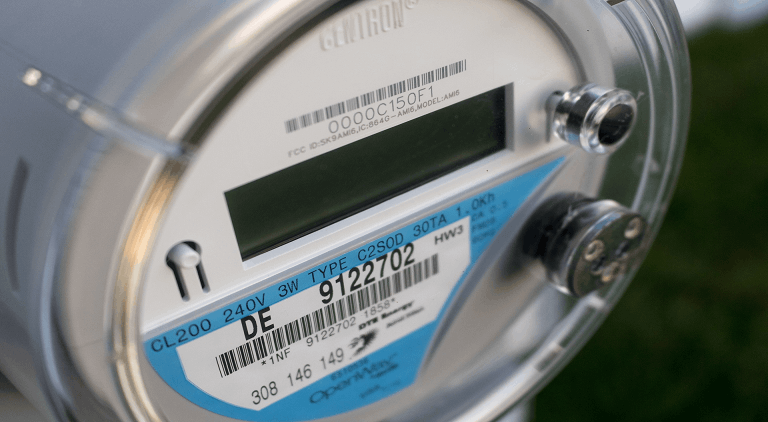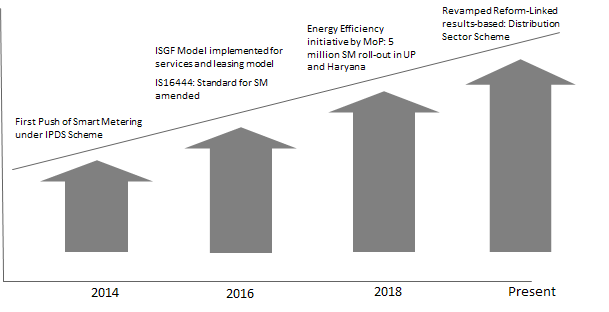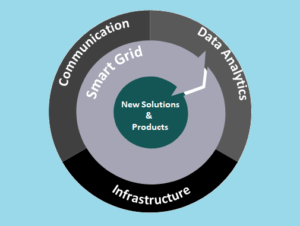Emerging trends in smart metering
By EPR Magazine Editorial July 8, 2021 5:23 pm IST
By EPR Magazine Editorial July 8, 2021 5:23 pm IST

Installation of smart meters and their use is gaining pace in India with the government’s policy to bring in smart intelligent solutions in the sector. Vinit Mishra writes more on the developments.
Before 2000, electromechanical meters dominated electricity measuring. They were only able to gauge electrical energy. However, it was determined that a meter capable of communicating and measuring electrical energy, as well as other electrical characteristics, was required.
Automatic meter reading was added to electronic meters between 2005 and 2014, which was a huge accomplishment since it allowed the data to be sent in real time. It could, however, only enable oneway communication. This constraint was solved with the development of smart meters, which can communicate in both directions. Smart meters, like electronic meters can monitor all electrical characteristics and convey data in a useful way.
Indian Smart Grid task force was launched in 2010 for activities related to ‘Smart Grid’ including smart metering (14 pilot projects) in India. Further, smart meters were pushed through IPDS scheme in India. On December 3, 2014, the Integrated Power Development Scheme was inaugurated. It was the Ministry of Power’s flagship project.

The National Smart Grid Mission was established in the year 2015 to accelerate Smart Grid deployment in India.
The key drivers that aided the power industry to gain momentum were:
Phase I (2014-17) and Phase II (2017-20) were two initiatives to support DISCOMs by including budgetary support for encouragement and mandating smart meter projects to increase financial stability.
The Budget for FY 2021 also announced the advent of the Revamp Scheme for distribution infrastructure.
The focus areas of the present smart metering scenario include:
| MoP | System Integrator | DISCOM | Consumer |
| The Government of India’s initiatives like ‘Make in India’ and ‘Smart Cities’ need the efficient and reliable power supply | Assured annual revenue for next 10 years | Revenue assurance (pre-paid smart metering) | Hassle free Discoms process like metering and billing |
| An encouragement for environmental conditions with less CO2 emissions | More business in Power sector | Better Load management | Better and prompt compliant redressal |
| Keeping up with Global Trends across power utilities | Better downstream opportunities like data monetization etc. | AT&C losses Reduction | Prepayment or postpaid mode of payment option |
| India to be the forerunner in Smart meter implementations across the country | Reduced operational cost (long term) | Net-metering and saving energy cost | |
| Alleviate DISCOMs from their financial distress | Better decision making and network planning | Awareness of energy consumption |
Advantages of smart meters
Government supportThe Indian power sector has been witnessing rapid changes with the government’s roll out of various policies for achievement of affordable and accessible 24×7 power for all. The policy support for promotion of smart metering has embarked (15 percent grant under draft guidelines of Revamp Scheme), but it has a long way to go.
Envisaging the policy support for the promotion of smart metering in India:
DISCOM:
System Integrator:
Consumer:
Supporting smart electricity initiatives
Modernising India’s grid system by investing in smart metering promises to mitigate several strains placed on the grid due to growing demand for electricity. In particular, AMI will improve these key features of India’s grid system including:
Product & technology trends
The worldwide smart meter market is projected to expand at 4 percent CAGR in the period of 2020-30. The Indian government mandates and supports policies for smart meter installation throughout enduse sectors such as residential, commercial, and industrial are credited to this increase. The new horizons in smart metering technologies in the various categories are:

Communication:
1) 5G
2) NbIoT
3) E-Sim
Infrastructure:
Data analytics:
Digital solutions will enable the transition to a contactless, data-driven utility.
Author: Vinit Mishra, Director – Technology Consulting, Ernst & Young LLP
We use cookies to personalize your experience. By continuing to visit this website you agree to our Terms & Conditions, Privacy Policy and Cookie Policy.